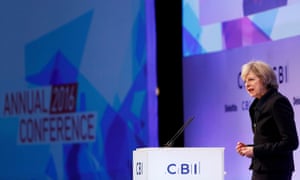Theresa May has said that her government is working towards avoiding a “cliff edge” for business when Britain’s two-year Brexit negotiating period comes to an end.
The comments, after a keynote speech at the CBI conference aimed at reaching out to the business community and easing their concerns, suggest ministers will be aiming to put a transitional deal in place.
“Obviously, as we look at the negotiation we want to get the arrangement that is going to work best for the UK and the arrangement that is going to work best for business in the UK. And I’m conscious that there will be issues that will need to be looked at,” May told delegates on Monday.
She said she understood “people don’t want a cliff edge, they want to know with some certainty how things are going to go forward”.
The prime minister added: “That will be part of the work that we do in terms of the negotiation that we are undertaking with the European Union.”
The comments were in response to a warning from the CBI president, Paul Drechsler, who said business did not need a running commentary but was looking for clarity and “above all, a plan”.
He described a timetable on article 50 and guarantees on EU funding as encouraging signs, adding: “It’s offset uncertainty around Brexit with greater certainty on Heathrow and Hinkley Point.”
But he said uncertainty remained, including over access to Europe’s talent, and the single market. “And there’s another important question: what happens on the day after Brexit? When the clock strikes midnight, and our two years’ negotiating time is up?” he said.
“Today, businesses are inevitably considering the cliff-edge scenario – a sudden and overnight transformation in trading conditions. If this happens, firms could find themselves stranded in a regulatory no man’s land.
“And even if our legal obligations are clear and in place there would also be real, practical implications. Our ports, airports and logistics firms, if faced with new trading rules, could suddenly need new and potentially complex paperwork, which would take more time and money to process.
“As a result, they’d need more warehouses to store more goods on-site, and more supply roads for the vehicles waiting to deliver them. At short notice. This would be impossible.”

Theresa May addresses the conference on Monday. Photograph: Stefan Wermuth/Reuters
Pressed later on whether May was signalling a transitional deal with the EU, the prime minister’s official spokeswoman suggested it was one option under consideration to guard against a sudden Brexit affecting businesses.
“She was reflecting the views we have expressed already about how we secure the best deal for the UK and how we seek to provide certainty where we can to businesses and people across the UK of the steps moving forward,” she said. “There are a whole range of issues that are being worked through as we prepare for the negotiations.”
Businesses are clamouring for a transitional deal because the two-year negotiation will be focused on the task of leaving the union, and not on any future trading arrangement.
At the end of the period the UK will automatically exit the EU, when some fear the country could face a cliff edge under which it would suddenly have to start dealing on unfavourable WTO terms.
The hope is that ministers will either extend the period before Britain officially exits, which would need the agreement of all the other 27 member states, or that a temporary deal will be agreed. That could see preferential trading terms and some form of free movement retained while negotiations continue.
However, the continuation of free movement could be difficult for May to explain going into an election in 2020, after her initial tough rhetoric on lowering immigration through leaving the EU.
Drechsler said companies were less interested in the argument over a hard or soft Brexit, which would dictate the levels of control over migration and economic access, than in the need for a “smooth Brexit”.
May addressed the issue during her speech in which she said Britain was at a “true national moment” that came with uncertainty but also opportunities.
“Opportunities to get out into the world and do new business with old allies and new partners. To use the freedoms that come from negotiating with partners directly, to be flexible, to set our own rules and forge new and dynamic trading agreements that work for the whole UK. Opportunities to become the true global champion of free trade,” she said.
May reiterated her suggestion that a running commentary would damage Britain’s negotiating power but said she understood businesses needed clarity. “So where I can set out our plans without prejudicing the negotiation to come I will,” she said.
“That’s why I have been able to set out the timetable for triggering article 50: before the end of March next year. Why I want an early agreement on the status of UK nationals in Europe and EU nationals here, so that you and they can plan with certainty. And why we have been engaging heavily with businesses over the past few months to understand your priorities and concerns, and why we will continue to do so.”www.theguardian.com








No comments:
Post a Comment